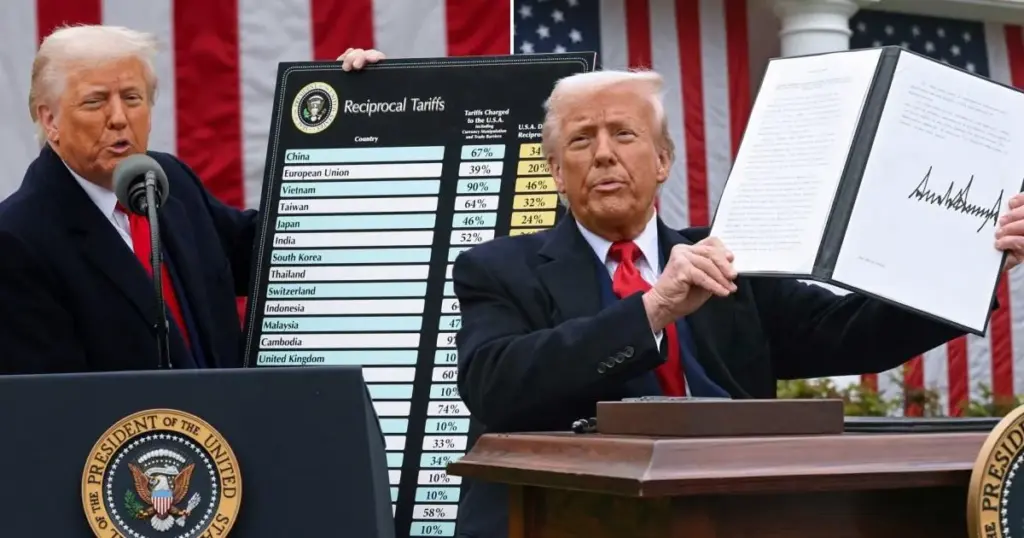- Google, Microsoft, Apple, Citigroup, Chase, JP Morgan, others on AU’s radar
Though the Federal Government is yet to respond to the hefty 14 per cent tariff rate slammed on Nigeria and others by President Donald Trump’s administration, Saturday Telegraph has gathered that Nigeria, Rwanda, South Africa and other countries in African Union (AU) are weighing up options of counter response to U.S. tariffs, as they target Big Tech, U.S manufacturing firms and U.S. banks on the continent via stiff regulations and other restrictions.
Apart from Nigeria, other African countries affected by the new policy include: Algeria (30 per cent); Lesotho (50 per cent); Mauritius (40 per cent); Kenya (10 per cent); Namibia (21 per cent) and Ethiopia as well as Ghana 10 per cent apiece. South Africa was handed a reciprocal tariff of 30 per cent.
PAMA official gives insight
A senior official in Pan-African Manufacturers Association (PAMA), one of the key arms of the African Union, who spoke on the condition of anonymity to Saturday Telegraph, specifically stated that Nigeria and others in the AU won’t fold up their arms without fighting back, saying Africa is the biggest hit from United States President Trump’s imposition of new tariff rates going as high as 50 per cent on all goods imported from the continent.
The PAMA official explained that Trump’s new tariff rate was a wake-up call for the AU and presents the opportunity to champion the ratified single unified African currency, better known as Afro or Afriq on the continent designed to weaken the strength of the Dollar, Euro, Yuan and other foreign currencies on the African continent and thus make African Continental Free Trade Agreement (AfCFTA) Area a success on the continent, especially achieving market of over 1.3 billion people and a $2.6 trillion Gross Domestic Product (GDP), being the largest single market in the world.
The reliable source told Saturday Telegraph that the size of the AfCFTA’s $2.6 trillion Gross Domestic Product (GDP) means such moves “could hit the U.S. hard in some of its investments on the African continent.”
‘AU to call extraordinary meeting’
According to him, the Chairperson of African Union (AU), Mr. João Lourenço, who doubles as the President of Angola, is being expected to call an extraordinary AU general meeting of Heads of State to review the latest Trump’s new tariff rates and its trade and economic implications on the continent but AU is keeping all options open if it fails to negotiate its way out of Trump’s hefty blanket tariffs slammed on African countries – and that could include going after the Big Tech, U.S. manufacturing firms and U.S. banks with stiffer regulations and other restrictions to protect African trade and markets.
The senior official said: “President Bola Tinubu of Nigeria; South African President, Mr. Cyril Ramaphosa; Rwanda President, Mr. Paul Kagame and other African leaders have contacted the AU Chairperson, Mr. João Lourenço, President of Angola on Trump’s hefty tariff imposition on African countries, and currently discussions are on to review AU’s next move in the wake of the U.S. trade war, especially the economic implications on Africa. But I can categorically tell you that AU is planning retaliatory response to the hefty new tariff imposed by President Trump, with Africa having the largest share, with some countries receiving up to 50 per cent. So, definitely AU would meet President Trump on the matter after calling for an extraordinary general meeting in Kigali, Rwanda, meant to take AU’s position on the U.S. hefty tariff.
“I can vividly tell you that U.S. companies like the Big Tech: Google, Microsoft, Apple Inc, U.S. banks like Citigroup (Citi) and JPMorgan Chase, many U.S. manufacturing companies having presence in Africa, with some focusing on specific sectors like oil, mining, and agriculture, would be under AU’s radar with hefty regulations and restrictions too. But I also know that championing the ratified single unified African currency also known as Afro or Afriq meant to weaken the strength of Dollar, Euro, Yuan and other foreign currencies on the African continent, including African Continental Free Trade Agreement (AfCFTA) Area on achieving market of over 1.3 billion people and a $2.6 trillion Gross Domestic Product (GDP), would be a key subject of discussion at the AU Heads of State extraordinary general meeting in Kigali, Rwanda.”
US businesses under threat
U.S. businesses on the African continent include automotive companies like General Motors, Ford, and Chrysler have a presence in South Africa, with Ford Motor Company of Southern Africa being a notable example. Oil and Energy: ExxonMobil and Chevron are involved in oil exploration and production, while companies like Mobil Corp. and Chevron Corp. have a history in the region. Mining: Freeport-McMoRan engages in mining copper and gold, and Anglo American Platinum Corporation is the world’s largest producer of natural platinum, with major operations in South Africa.
Agriculture: Cargill is involved in agricultural products and services. Technology: Microsoft has significant partnerships in Africa, focusing on technology and software solutions.
Other notable U.S. companies include: Goodyear and Firestone: Tire manufacturers with a presence in the region. IBM: A technology company with operations in Africa. 3M: A diversified technology company with a presence in Africa. Caterpillar: A manufacturer of construction and mining equipment.
Procter & Gamble (P&G): Invested in a manufacturing hub in Southern and East Africa. Kubik Inc, a USA-incorporated company that deals in converting plastic waste into affordable building materials for public and commercial use. American Augers Inc, a manufacturing company that expanded into the South African market.















